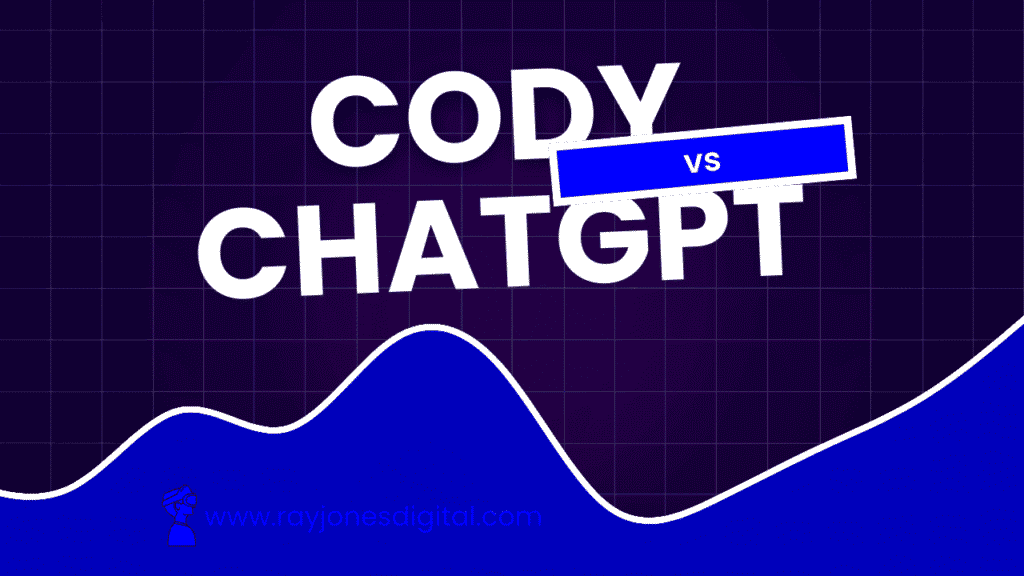
The AI coding assistant market has exploded over the past two years, with new tools promising to revolutionise how developers write, debug, and understand code. Two platforms have emerged as frontrunners: Cody, developed by Sourcegraph, and ChatGPT, OpenAI’s conversational AI that has captivated the tech world.
Both tools offer powerful capabilities for developers, but they take fundamentally different approaches to AI-assisted coding. Cody specialises in understanding your entire codebase context, whilst ChatGPT excels at general-purpose programming assistance and problem-solving.
Choosing between them isn’t straightforward. Your decision depends on your specific coding needs, team structure, and workflow preferences. This comprehensive comparison will help you understand the strengths and limitations of each tool, so you can make an informed choice about which AI assistant deserves a place in your development toolkit.
What is Cody?
Cody is an AI coding assistant built by Sourcegraph, designed specifically for developers who need deep codebase understanding. Unlike general-purpose AI tools, Cody integrates directly with your existing code repositories and development environment.
The platform’s standout feature is its ability to understand your entire codebase context. When you ask Cody a question about your code, it doesn’t just process the snippet you’ve shared—it analyses your entire project structure, including dependencies, documentation, and related files. This contextual awareness allows Cody to provide more accurate and relevant suggestions.
Cody supports multiple programming languages and integrates seamlessly with popular IDEs like VS Code, IntelliJ, and Vim. It can help with code generation, debugging, refactoring, and even explaining complex code sections to new team members.
The tool is particularly valuable for large development teams working on complex projects where understanding the broader codebase context is crucial for making informed decisions.
What is ChatGPT?
ChatGPT needs little introduction. OpenAI’s conversational AI has become the go-to tool for millions of developers seeking coding assistance. While not specifically designed for programming, ChatGPT has proven remarkably capable at understanding and generating code across virtually every programming language.
The platform excels at explaining coding concepts, helping with algorithm design, debugging problems, and providing step-by-step solutions to programming challenges. Its conversational interface makes it particularly approachable for developers who prefer to describe their problems in natural language rather than technical queries.
ChatGPT’s strength lies in its vast training data and ability to handle diverse programming scenarios. Whether you’re working with Python data analysis, React components, or database queries, ChatGPT can provide relevant assistance and explanations.
The tool is especially valuable for learning new technologies, exploring different approaches to solving problems, and getting quick answers to specific coding questions.
Key differences between Cody and ChatGPT
Codebase integration
The most significant difference lies in how each tool handles your existing code. Cody integrates directly with your repositories, understanding your project structure, coding patterns, and dependencies. This integration means Cody can provide suggestions that align with your existing codebase conventions and architecture.
ChatGPT operates in isolation. You need to manually share code snippets or describe your project structure. While this approach works well for specific questions, it limits ChatGPT’s ability to understand the broader context of your work.
IDE integration
Cody offers native integration with popular development environments, appearing as a sidebar or inline assistant within your IDE. This seamless integration allows you to ask questions and receive suggestions without leaving your coding environment.
ChatGPT requires switching between your IDE and a web browser or separate application. Some third-party extensions exist, but the experience isn’t as polished as Cody’s native integration.
Contextual understanding
Cody’s ability to understand your entire codebase gives it a significant advantage for complex projects. When you ask about a specific function, Cody knows how that function relates to other parts of your system, what dependencies it uses, and how it fits into your overall architecture.
ChatGPT relies on the information you provide in your conversation. While it can maintain context within a single chat session, it cannot understand the broader context of your project unless you explicitly share that information.
Code generation approach
Both tools can generate code, but their approaches differ significantly. Cody generates code that follows your existing patterns and conventions, making it more likely to integrate seamlessly with your current codebase.
ChatGPT generates code based on general best practices and common patterns. While the code is often high-quality, it may not align with your specific coding style or project requirements without additional customisation.
When to choose Cody
Cody excels in specific scenarios where contextual understanding is paramount. If you’re working on a large, complex codebase with multiple developers, Cody’s ability to understand your entire project structure becomes invaluable.
Teams working on long-term projects with established coding conventions will find Cody particularly useful. The tool can help maintain consistency across the codebase and ensure new code aligns with existing patterns.
Cody is also ideal for developers who prefer to work entirely within their IDE. The seamless integration means you can access AI assistance without disrupting your workflow or switching between applications.
Enterprise teams with strict security requirements may prefer Cody’s approach to data handling and integration with existing development infrastructure.
When to choose ChatGPT
ChatGPT shines for general programming assistance and learning. If you’re exploring new technologies, learning programming concepts, or working on diverse projects, ChatGPT’s broad knowledge base and conversational interface make it an excellent choice.
Freelancers and solo developers who work on multiple small projects may find ChatGPT more practical than Cody. The tool’s versatility and ability to handle various programming languages and frameworks make it suitable for diverse work.
ChatGPT is also valuable for debugging and problem-solving scenarios where you need to explore different approaches. Its ability to explain complex concepts in simple terms makes it particularly useful for educational purposes.
Developers who prefer a conversational approach to AI assistance will appreciate ChatGPT’s natural language interface and ability to engage in detailed discussions about programming concepts.
Pricing and accessibility
Cody offers both free and paid tiers, with the free version providing basic functionality and limited usage. The paid versions unlock advanced features like unlimited usage, priority support, and enhanced integrations.
ChatGPT provides a free tier with usage limitations and ChatGPT Plus for unlimited access to more advanced models. The pricing structure is generally more straightforward than Cody’s enterprise-focused options.
Both tools offer reasonable pricing for individual developers, but enterprise pricing can vary significantly based on team size and specific requirements.
Making the right choice for your needs
The decision between Cody and ChatGPT ultimately depends on your specific development context and preferences. Consider your project complexity, team size, and workflow requirements when making your choice.
If you’re working on a large, complex codebase with an established team, Cody’s contextual understanding and IDE integration make it the stronger choice. The tool’s ability to maintain consistency with your existing code patterns can significantly improve development efficiency.
For general programming assistance, learning, and diverse project work, ChatGPT’s versatility and conversational interface provide excellent value. The tool’s broad knowledge base and ability to handle various programming scenarios make it suitable for most development needs.
Many developers find value in using both tools for different purposes. Cody for project-specific work and ChatGPT for general assistance and learning represents a pragmatic approach that maximises the benefits of each platform.

I am Ray Jones Digital
My current occupations: a Digital Marketer, Local SEO expert, Link Builder, and WordPress SEO specialist. Shopify SEO, Ecommerce Store Management, and HTML & WordPress Developer I have been practicing the above mentioned services for more than 10 years now As an SEO expert working with your ongoing projects.


![Features, Pros and Cons - [Ultimate ChatGPT Reviews] Ultimate ChatGPT Reviews](https://rayjonesdigital.com/wp-content/uploads/2024/06/Ultimate-ChatGPT-Reviews-150x150.jpeg)
